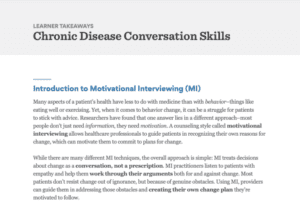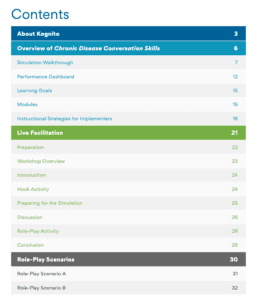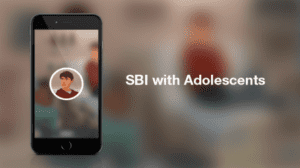New: Resources for Clinical Healthcare Simulations
Our clients know that the clinical healthcare simulation experience isn’t over when the browser closes.
In fact, we know that many of our clients who are incorporating Kognito simulations into curriculum for their nursing, social work, and medical students often complement the experience with in-person or live discussion to reinforce the learning and discuss practical applications that their students may encounter in their careers.
At the University of Michigan School of Nursing, SBI with Adolescents is offered to students every semester. Four hours are devoted exclusively to adolescent SBIRT. Students are given time to complete the 60-minute SBI with Adolescents simulation to receive clinical credit. The remaining time is divided between a didactic lecture on prevention and SBIRT for substance use in primary care, and a face-to-face clinical simulation where interactive role-plays are performed in group settings (read the case study here!)
This is just one example of the many ways that schools of health professions have incorporated Kognito simulations into course content. Today, Kognito is excited to announce new resources for learners and instructors that integrate virtual simulation with the classroom.
For Learners

After completing a simulation, learners now have access to a downloadable content summary of the simulation. Students are able to revisit these resources after completing the simulation to have core evidence-based communication techniques and examples from the simulation at their disposal. The page includes links to additional educational materials and tools that can be used when working with patients or clients. These resources are accessible from the simulation and can be customized to include institution-specific or course-related materials.
For Instructors

Kognito now provides instructors with a Facilitator Guide that includes pre-brief and debrief exercises and strategies for using the simulation as part of an in-person or distance learning curriculum. Facilitator Guides help instructors incorporate simulation training into their course curricula, enhancing the 30-60 minute simulation experience to provide many more hours of clinical training. Guides include:
- An overview of the simulation, including learning goals and instructional strategies
- Workshop overviews including hook activities
- Discussion questions
- Live role-play scenarios
- And more!
Are Kognito’s Healthcare Simulations Right For Your Program?
Our healthcare simulations leverage virtual patients to emulate real healthcare scenarios. A virtual coach helps students learn evidence-based techniques to have effective conversations with patients, and then students have the opportunity to practice these techniques in a safe learning environment. The virtual coach then provides personalized feedback, allowing students to hone in on their skills without putting any real patients at risk.
“The way the Kognito simulation is done is the closest you can come to actually having a conversation like this, but still be doing it in an actual simulation … it’s the most realistic simulation that I have worked with.”
– Dr. Cathy Koetting D.N.P., APRN, CPNP, NP-C, Assistant Professor, Saint Louis University School of Nursing

Our simulation-based education solutions have been deployed by schools of health professions, as well as leading healthcare organizations, and state/local agencies. They use evidence-based approaches, are backed by peer-reviewed studies, and many can fulfill clinical requirements. Plus, they can be deployed quickly with little staff time needed for roll-out.
For more previews of these new resources or questions about Kognito’s clinical healthcare simulations for students, schedule a personalized 1:1 with us here.